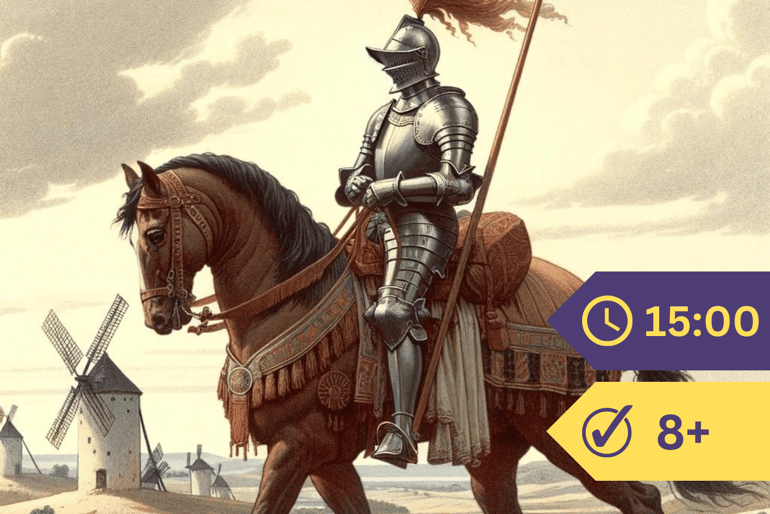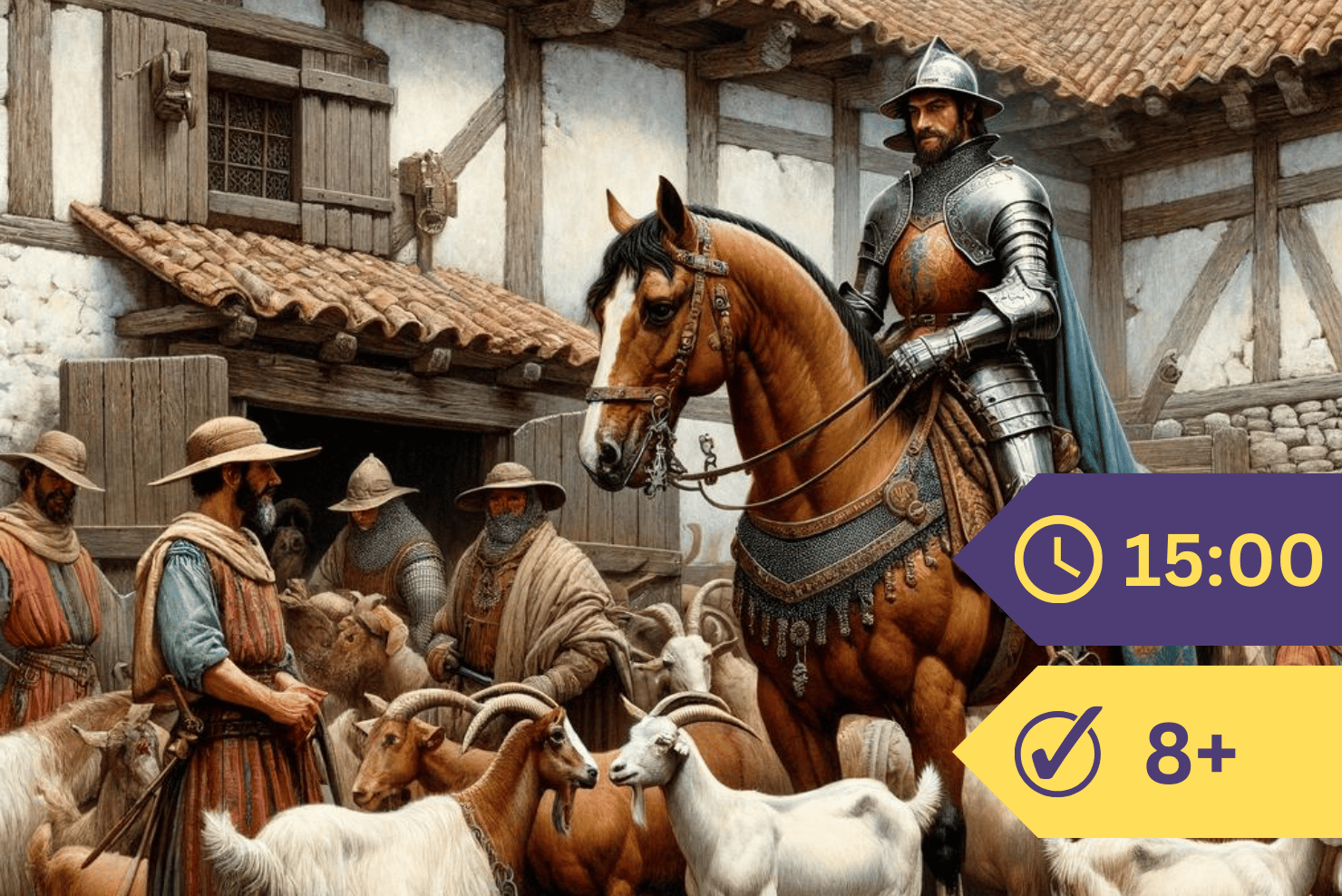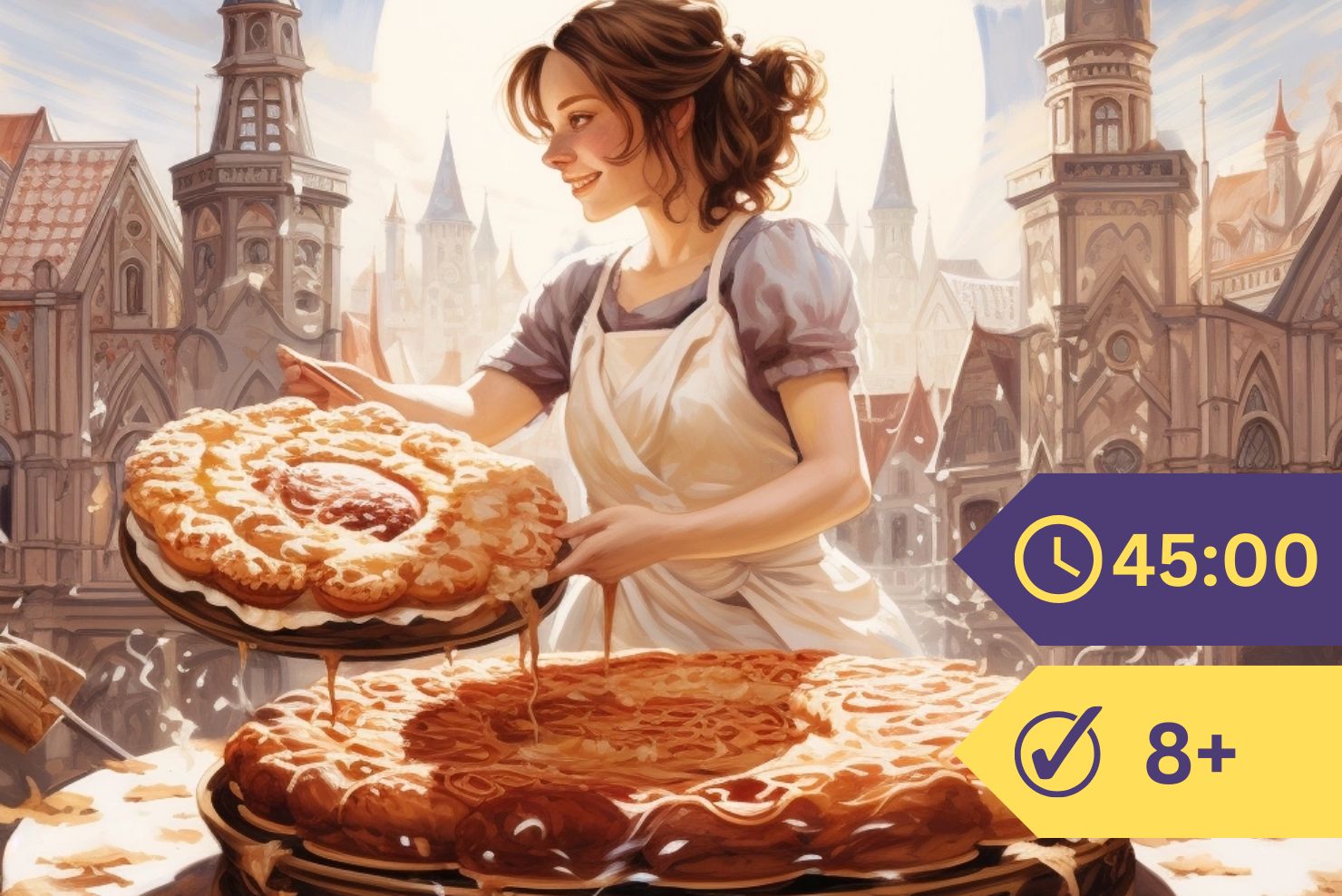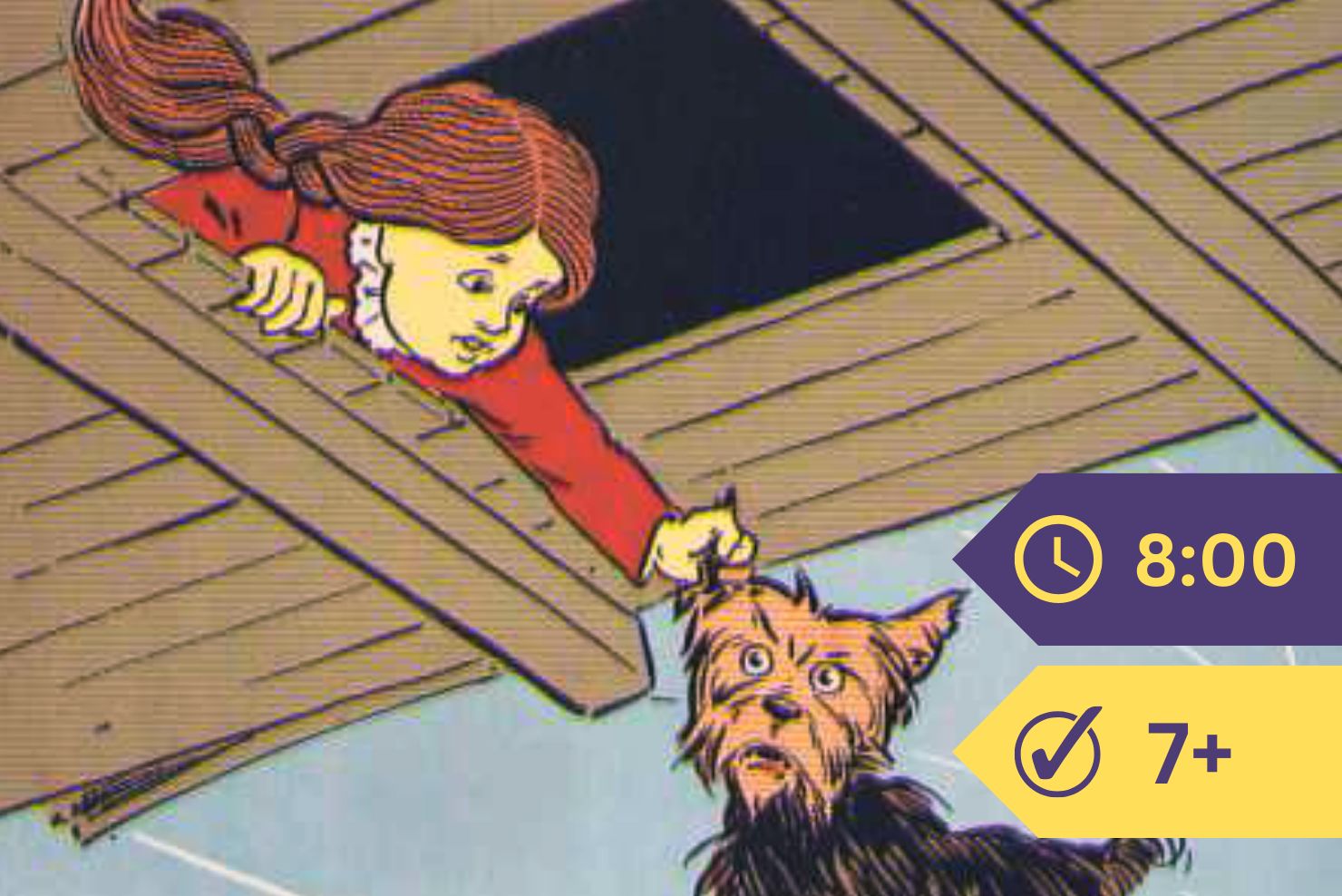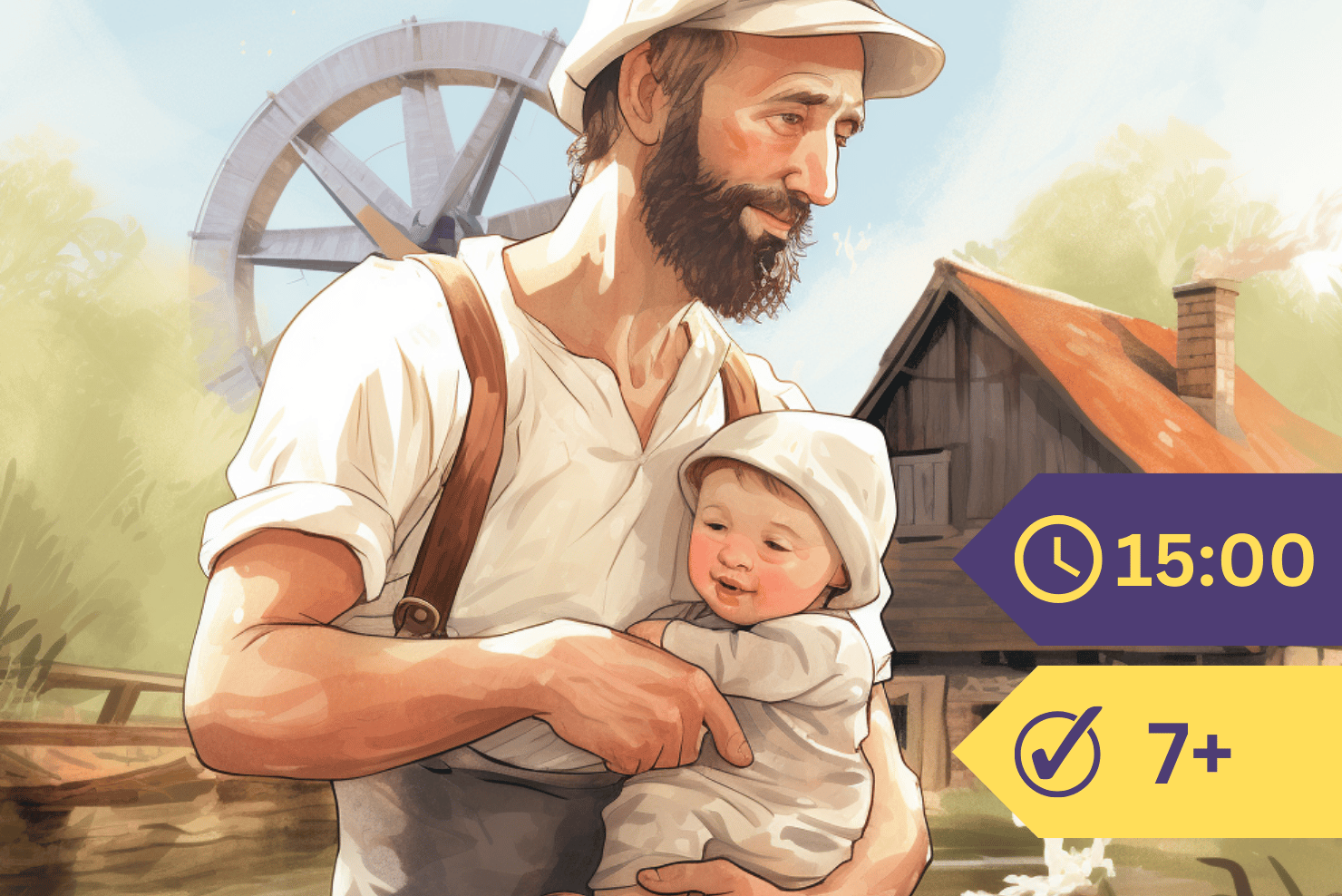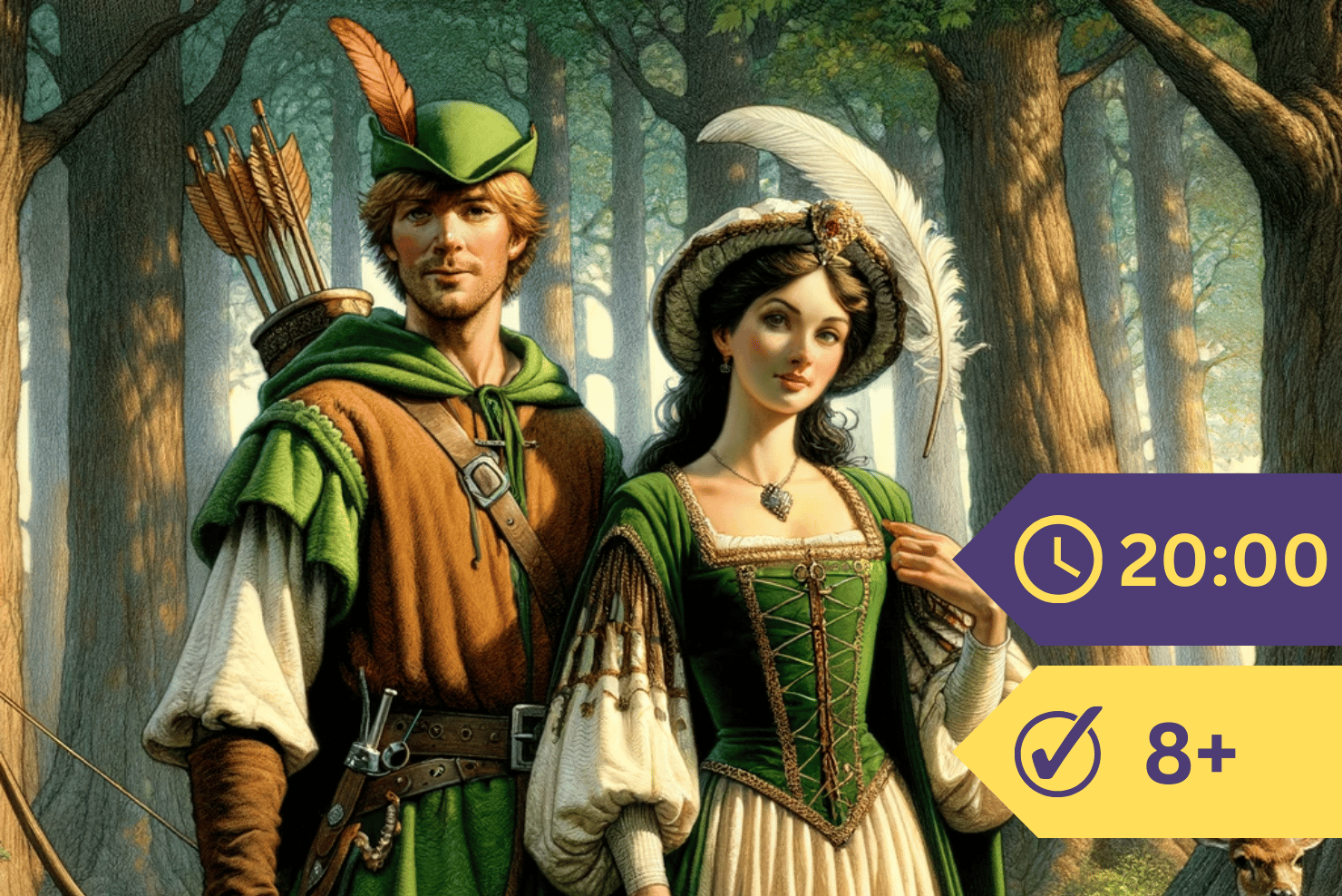Don Quixote persuaded a certain labourer, his neighbour, an honest man, but one of very shallow wit, to go away with him and serve him as squire. In the end he gave him so many fair words and promises that the poor fellow determined to go with him. Don Quixote, among other things, told him that he ought to be very pleased to depart with him, for at some time or other an adventure might befall which should in the twinkling of an eye win him an island and leave him governor thereof. On the faith of these and other like promises, Sancho Panza (for so he was called) forsook his wife and children and took service as squire to his neighbour.
Whilst they were journeying along, Sancho Panza said to his master: “I pray you have good care, sir knight, that you forget not that government of the island which you have promised me, for I shall be able to govern it be it never so great.”
And Don Quixote replied: “Thou must understand, friend Sancho, that it was a custom very much used by the ancient knights-errant, to make their squires governors of the islands and kingdoms they conquered, and I am resolved that so good a custom shall be kept up by me. And if thou livest and I live it may well be that I might conquer a kingdom within six days, and crown thee king of it.”
“By the same token,” said Sancho Panza, “if I were a king, then should Joan my wife become a queen and my children princes?”
“Who doubts of that?” said Don Quixote.
“That do I,” replied Sancho Panza, “for I am fully persuaded that though it rained kingdoms down upon the earth, none of them would sit well on my wife Joan. She is not worth a farthing for a queen. She might scrape through as a countess, but I have my doubts of that.”
As they were talking, they caught sight of some thirty or forty windmills on a plain. As soon as Don Quixote saw them he said to his squire: “Fortune is guiding our affairs better than we could desire. For behold, friend Sancho, how there appear thirty or forty monstrous giants with whom I mean to do battle, and take all their lives. With their spoils we will begin to be rich, for this is fair war, and it is doing great service to clear away these evil fellows from off the face of the earth.”
“What giants?” said Sancho amazed.
“Those thou seest there,” replied his master, “with the long arms.”
“Take care, sir,” cried Sancho, “for those we see yonder are not giants but windmills, and those things which seem to be arms are their sails, which being whirled round by the wind make the mill go.”
“It is clear,” answered Don Quixote, “that thou art not yet experienced in the matter of adventures. They are giants, and if thou art afraid, get thee away home, whilst I enter into cruel and unequal battle with them.”
So saying, he clapped spurs to Rozinante, without heeding the cries by which Sancho Panza warned him that he was going to encounter not giants but windmills. For he would neither listen to Sancho’s outcries, nor mark what he said, but shouted to the windmills in a loud voice: “Fly not, cowards and vile creatures, for it is only one knight that assaults you!”
A slight breeze having sprung up at this moment, the great sail-arms began to move, on seeing which Don Quixote shouted out again: “Although you should wield more arms than had the giant Briareus, I shall make you pay for your insolence!”
Saying this, and commending himself most devoutly to his Lady Dulcinea, whom he desired to aid him in this peril, covering himself with his buckler, and setting his lance in rest, he charged at Rozinante’s best gallop, and attacked the first mill before him. Thrusting his lance through the sail, the wind turned it with such violence that it broke his weapon into shivers, carrying him and his horse after it, and having whirled them round, finally tumbled the knight a good way off, and rolled him over the plain, sorely damaged.
Sancho Panza hastened to help him as fast as his ass could go, and when he came up he found the knight unable to stir, such a shock had Rozinante given him in the fall.
“Bless me,” said Sancho, “did I not tell you that you should look well what you did, for they were windmills, nor could any think otherwise unless he had windmills in his brains!”
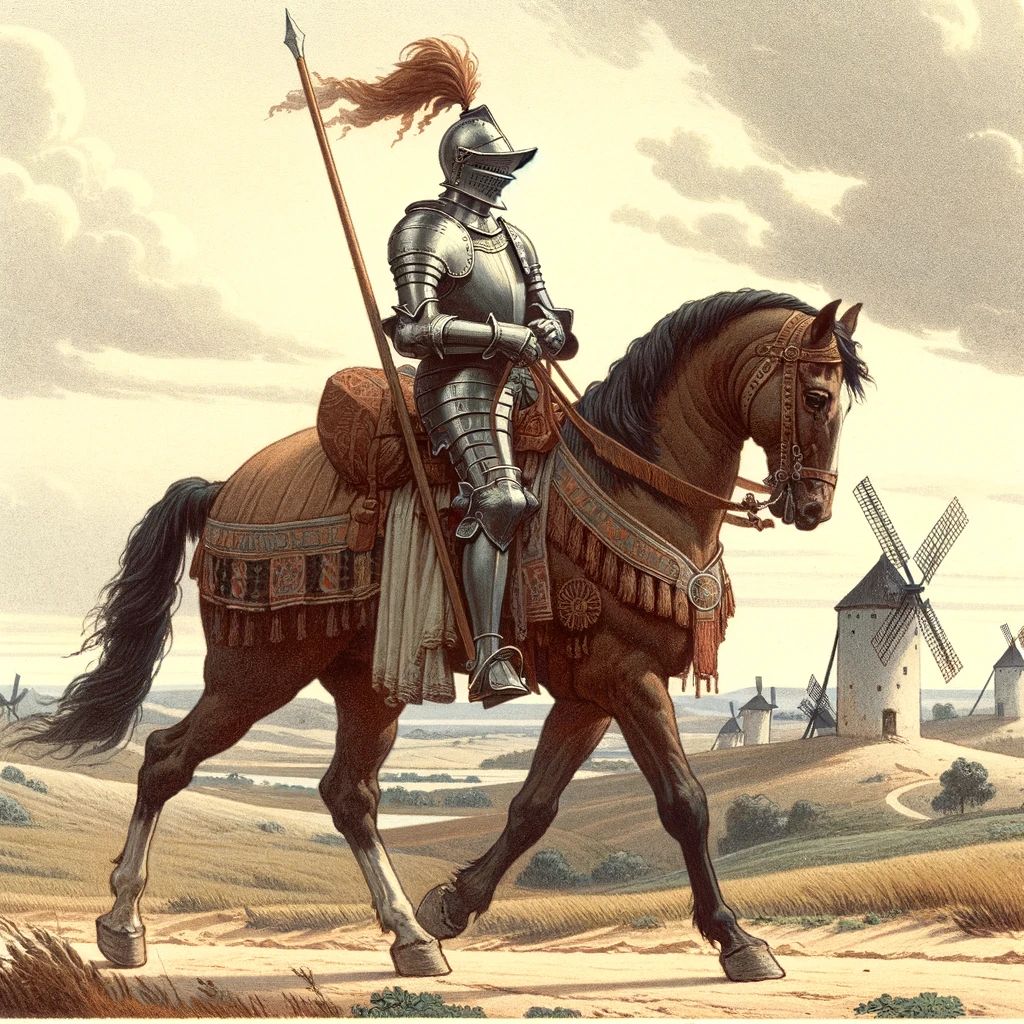
“Peace, friend Sancho,” said Don Quixote, “for the things of war are constantly changing, and I think this must be the work of the same sage Freston who robbed me of my library and books, and he hath changed these giants into windmills to take from me the glory of the victory. But in the end his evil arts shall avail but little against the goodness of my sword.”
“May it prove so,” said Sancho, as he helped his master to rise and remount Rozinante, who, poor steed, was himself much bruised by the fall.
The next day they journeyed along towards the Pass of Lapice, a romantic spot, at which they arrived about three o’clock in the afternoon.
“Here,” said Don Quixote to his squire, “we may hope to dip our hands up to the elbows in what are called adventures. But take note of this, that although thou seest me in the greatest dangers of the world, thou art not to set hand to thy sword in my defence, unless those who assault me be base or vulgar people. If they be knights thou mayest not help me.”
“I do assure you, sir,” said Sancho, “that herein you shall be most punctually obeyed, because I am by nature a quiet and peaceful man, and have a strong dislike to thrusting myself into quarrels.”
Whilst they spoke thus, two friars of the order of St. Benedict, mounted on large mules—big enough to be dromedaries—appeared coming along the road. They wore travelling masks to keep the dust out of their eyes and carried large sun umbrellas. After them came a coach with four or five a-horseback travelling with it, and two lackeys ran hard by it. In the coach was a Biscayan lady who was going to Seville. The friars were not of her company, though all were going the same way.
Scarcely had Don Quixote espied them than he exclaimed to his squire: “Either I much mistake, or this should be the most famous adventure that hath ever been seen; for those dark forms that loom yonder are doubtless enchanters who are carrying off in that coach some princess they have stolen. Therefore I must with all my power undo this wrong.”
“This will be worse than the adventure of the windmills,” said Sancho. “Do you not see that they are Benedictine friars, and the coach will belong to some people travelling?”
“I have told thee already, Sancho,” answered Don Quixote, “that thou art very ignorant in the matter of adventures. What I say is true, as thou shalt see.”
So saying he spurred on his horse, and posted himself in the middle of the road along which the friars were coming, and when they were near enough to hear him he exclaimed in a loud voice: “Monstrous and horrible crew! Surrender this instant those exalted princesses, whom you are carrying away in that coach, or prepare to receive instant death as a just punishment of your wicked deeds.”
The friars drew rein, and stood amazed at the figure and words of Don Quixote, to whom they replied: “Sir knight, we are neither monstrous nor wicked, but two religious men, Benedictines, travelling about our business, and we know nothing about this coach or about any princesses.”
“No soft words for me,” cried Don Quixote, “for I know you well, treacherous knaves.”
And without waiting for their reply he set spurs to Rozinante; and laying his lance on his thigh, charged at the first friar with such fury and rage, that if he had not leaped from his mule he would have been slain, or at least, badly wounded.
The second friar, seeing the way his companion was treated, made no words but fled across the country swifter than the wind itself.
Sancho Panza, on seeing the friar overthrown, dismounted very speedily off his ass and ran over to him, and would have stripped him of his clothes, But two of the friars’ servants came up and asked him why he was thus despoiling their master. Sancho replied that it was his due by the law of arms, as lawful spoils gained in battle by his lord and master, Don Quixote.
The lackeys, who knew nothing of battles or spoils, seeing that Don Quixote was now out of the way, speaking with those that were in the coach, set both at once upon Sancho and threw him down, plucked every hair out of his beard and kicked and mauled him without mercy, leaving him at last stretched on the ground senseless and breathless.
As for the friar, he mounted again, trembling and terror-stricken, all the colour having fled from his face, and spurring his mule, he joined his companion, who was waiting for him hard by.
While this was happening, Don Quixote was talking to the lady in the coach, to whom he said: “Dear lady, you may now dispose of yourself as you best please. For the pride of your robbers is laid in the dust by this my invincible arm. And that you may not pine to learn the name of your deliverer, know that I am called Don Quixote of the Mancha, knight-errant, adventurer, and captive of the peerless and beauteous Lady Dulcinea of Toboso. And in reward for the benefits you have received at my hands, I demand nothing else but that you return to Toboso, there to present yourself in my name before my lady, and tell her what I have done to obtain your liberty.”
All this was listened to by a Biscayan squire who accompanied the coach. He hearing that the coach was not to pass on but was to return to Toboso, went up to Don Quixote, and, laying hold of his lance, said to him: “Get away with thee, sir knight, for if thou leave not the coach I will kill thee as sure as I am a Biscayan.”
“If,” replied Don Quixote haughtily, “thou wert a gentleman, as thou art not, I would ere this have punished thy folly and insolence, caitiff creature.”
“I no gentleman?” cried the enraged Biscayan. “Throw down thy lance and draw thy sword, and thou shalt soon see that thou liest.”
“That shall be seen presently,” replied Don Quixote; and flinging his lance to the ground he drew his sword, grasped his buckler tight, and rushed at the Biscayan.
The Biscayan, seeing him come on In this manner, had nothing else to do but to draw his sword. Luckily for him he was near the coach, whence he snatched a cushion to serve him as a shield, and then they fell on one another as if they had been mortal enemies.
Those that were present tried to stop them, but the Biscayan shouted out that if he were hindered from ending the battle he would put his lady and all who touched him to the sword.
The lady, amazed and terrified, made the coachman draw aside a little, and sat watching the deadly combat from afar.
The Biscayan, to begin with, dealt Don Quixote a mighty blow over the target, which, if it had not been for his armour, would have cleft him to the waist. Don Quixote, feeling the weight of this tremendous blow which had destroyed his visor and carried away part of his ear, cried out aloud: “O Dulcinea, lady of my soul, flower of all beauty, help thy knight, who finds himself in this great danger!” To say this, to raise his sword, to cover himself with his buckler, and to rush upon the Biscayan was the work of a moment. With his head full of rage he now raised himself in his stirrups, and, gripping his sword more firmly in his two hands, struck at the Biscayan with such violence that he caught him a terrible blow on the cushion, knocking this shield against his head with tremendous violence. It was as though a mountain had fallen on the Biscayan and crushed him, and the blood spouted from his nose and mouth and ears. He would have fallen straightway from his mule if he had not clasped her round the neck; but he lost his stirrups, then let go his arms, and the mule, frightened at the blow, began to gallop across the fields, so that after two or three plunges it threw him to the ground.
Don Quixote leaped off his horse, ran towards him, and setting the point of his sword between his eyes, bade him yield, or he would cut off his head.
The lady of the coach now came forward in great grief and begged the favour of her squire’s life.
Don Quixote replied with great stateliness: “Truly, fair lady, I will grant thy request, but it must be on one condition, that this squire shall go to Toboso and present himself in my name to the peerless Lady Dulcinea, that she may deal with him as she thinks well.”
The lady, who was in great distress, without considering what Don Quixote required, or asking who Dulcinea might be, promised that he should certainly perform this command.
“Then,” said Don Quixote, “on the faith of that pledge I will do him no more harm.”
Seeing the contest was now over, and his master about to remount Rozinante, Sancho ran to hold his stirrups, and before he mounted, taking him by his hand he kissed it and said: “I desire that it will please you, good my lord Don Quixote, to bestow on me the government of that island which in this terrible battle you have won.”
To which Don Quixote replied: “Brother Sancho, these are not the adventures of islands, but of cross roads, wherein nothing is gained but a broken pate or the loss of an ear. Have patience awhile, for the adventures will come whereby I can make thee not only a governor, but something higher.”
Sancho thanked him heartily, and kissed his hand again and the hem of his mailed shirt. Then he helped him to get on Rozinante, and leaped upon his ass to follow him.
And Don Quixote, without another word to the people of the coach, rode away at a swift pace and turned into a wood that was hard by, leaving Sancho to follow him as fast as his beast could trot.

